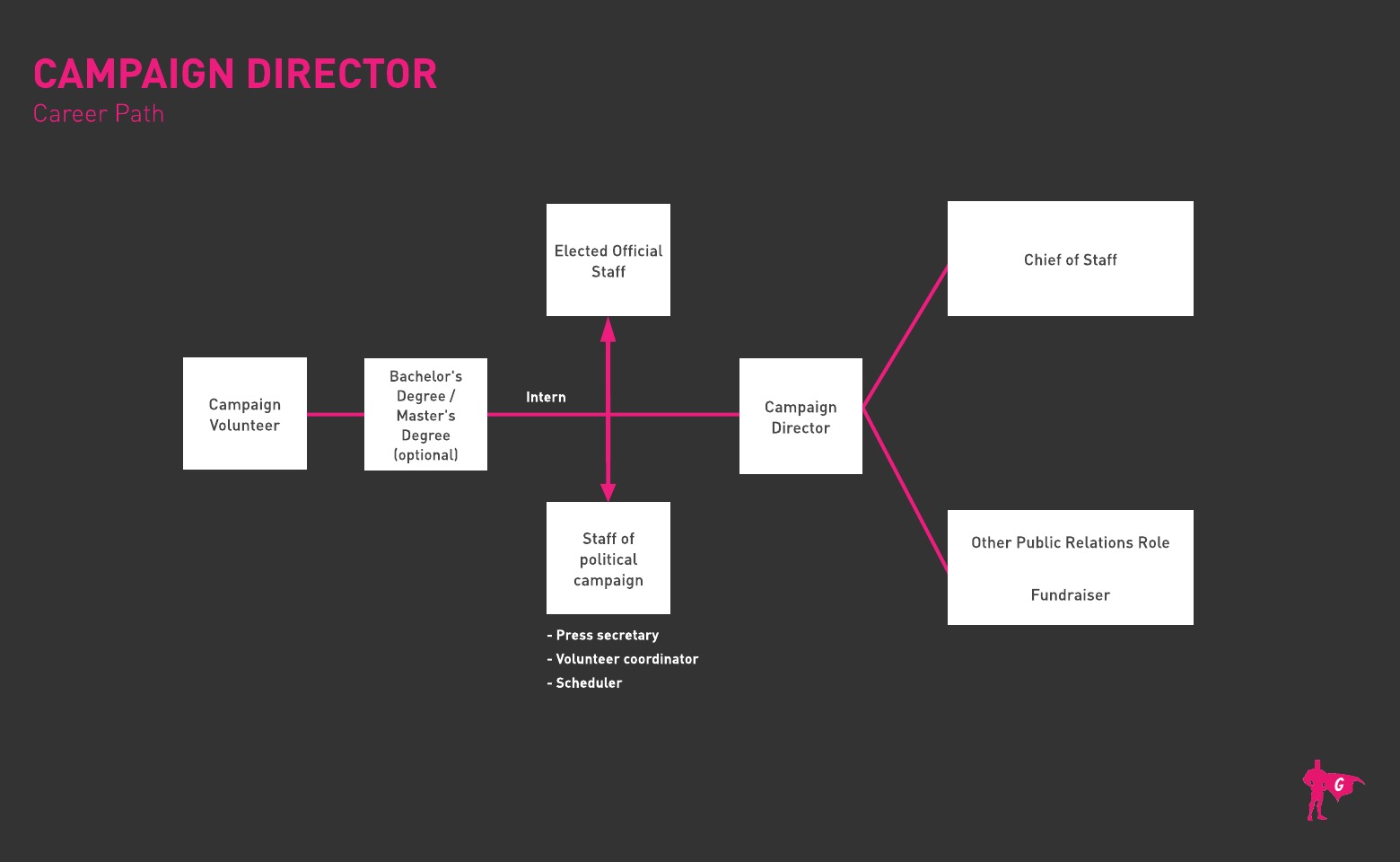Spotlights
A “Campaign Manager” is also referred to as a “Campaign Director” or “Campaign Chairman.”
A Campaign Manager is an individual responsible for coordinating another individual’s attempt to win a political office. They work with the candidate to help fundraise, lead advertising, check polling, convince people to vote, and other activities which directly support the candidate. There are times they will speak to the press in lieu of the candidate.
It is a very broad and multi-faceted role. The Campaign Manager is typically second only to the Candidate in the campaign. Some of the specific tasks can differ slightly depending on the office the candidate is running for, but a Campaign Manager can plan on an all-encompassing role during the campaign.
Some campaign managers will stay employed by the same candidate or elected official, and some may move from candidate to candidate. This position is typically temporary and follows an election cycle.
A political Campaign Manager will work for a campaign at a local, state, or Federal level.
- Input on a candidate’s platform and future public policy.
- Helping elect officials you truly believe in.
- Being part of change at various levels of government.
- Every day brings a new challenge.
Political Campaign Managers have very different day to day experiences. They are typically active only during a campaign. This can mean many different tasks both in an office setting and in the field with voters:
- Exploring via polling if a candidate has a good chance of winning an election (Before becoming a candidate)
- Hiring campaign workers and volunteers. This can be done directly, or hiring assistants to follow established protocol.
- Continuing to collect polling data and using it to adjust the campaign.
- Setting fundraising goals and organizing this effort.
- Determining the best ways to use campaign funds in advertising, paying campaign workers, and similar campaign functions.
- Working with the candidate and workers to make sure a clear vision for the campaign is followed.
- Working with the candidate to help write speeches, craft position papers, and filling in for the candidate at public appearances.
When the campaign is over, the Campaign Manager may continue working for the candidate as a Chief of Staff or similar position. They may also move on to other work.
Soft Skills
- Oral and Written Communication Skills
- Strong Active Listening Skills
- Coordination and Detail Oriented
- Critical Thinking
- Time Management
- Leadership
Technical Skills
- Database Analysis skills to study polling
- Sales/Marketing – Creating strong copy and media for a candidate.
- Basic understanding of video editing, graphic design, and web development
- A strong understanding of how your government works at the level of the campaign.
This job involves knowledge of public relations as well as how to implement data.
A political Campaign Manager will work long hours and be prepared to work with many different individuals. You will typically start political work as an unpaid volunteer for a campaign. If you are able to demonstrate the skills needed, you may be hired onto later campaigns.
While experience is the main factor in becoming a Campaign Manager, education is also considered heavily. Many Campaign Managers hold master’s degrees in public relations or political science. Most will have a bachelor’s degree in political science.
During non-election years, you can work directly for an elected official. This will eventually lead to work as they campaign. If you are working for a smaller campaign, you will likely need to supplement the role with another job.
While rewarding, political campaigns are also stressful. There are many time-sensitive tasks staff are responsible for. You are also working toward a victory. If your candidate is not polling well, they may blame the job you are doing.
- Campaigns have grown more polarized, with greater emphasis on political party
- Polling is slowly being adjusted to include dedicated focus group conversations
- There is a greater emphasis on digital ads and social media
- There has been growth in grassroots and populist movements. Political Campaigns are trying to build connections with these groups of voters.
- As campaigns become more targeted, there will be a greater need for data analysis
- Helping or running for class positions in school.
- Talking with people and learning about who they are.
- Debating and convincing friends and relatives of their ideas
- Campaign Managers usually have a bachelor’s in communications, public relations, political science, or even history
- Political science programs often feature useful internship experiences for students
- Experience is a key element in becoming an effective Campaign Manager, which is why many learn through entry-level jobs, working in active campaigns as a volunteer, assistant, or intern
- Many Campaign Managers have a background in law, marketing, writing, and public speaking
- A Master’s in Political Science or Public Administration can help distinguish you from the competition
- Optional related certifications include:
- Association of Fundraising Professionals - Certified Fund Raising Executive
- Certified Fund Raising Executive International - Certified Fund Raising Executive
- International Association of Business Communicators - Communication Management Professional or Strategic Communication Management Professional
- Public Relations Society of America - Accreditation in Public Relations
- Stock up on courses like English, writing, speech, history, psychology, politics, math, economics, marketing, and data analysis
- Participate in the debate team and student government. Try to tackle large projects with lots of moving pieces so you can learn project management and coordination skills
- Learn the basics of the Federal Election Commission’s political fundraising rules
- Get familiar with campaign budgeting guidelines and best practices
- Stay involved with local campaigns. Request to rotate activities, starting at the grassroots “boots on the ground level” so you can see the whole picture and engage with voters
- Ask local Campaign Managers if you can shadow them or if they can mentor you in exchange for assistance with administrative tasks
- Volunteer for a local campaign
- Read about campaigns in the news and pay attention to the details of what is working (and what’s not)
- Check out Sprout Social’s Social media and politics: 10 best practices for campaigns to know
- Don’t neglect your academic studies while engaging in your political activities! You have to find a balance that works and allows you to prioritize school work

It is highly unlikely you will be given a position as a Campaign Manager without years of established experience with campaigns and public relations. However, this experience can begin as early as high school. Political Campaigns will often need volunteers and you can likely call or arrive at a campaign office to volunteer.
Be ready to do menial tasks such as stuffing envelopes or putting together yard signs. There are many small tasks a campaign’s volunteers will need to do. If you demonstrate a passion and willingness to work, you may be hired for jobs with later campaigns.
You will have a much greater chance of being hired by a campaign or as a political staffer if you also complete a degree in Political Science, or similar field. Your program should include one or more internships. If you are able to be aggressive in finding these at higher levels, you can build a strong network of connections who can help you use the experience when you graduate.
Be sure to maintain your network, even across political party lines. Depending on the level of government, elected officials can provide recommendations for each other’s staff, even if not part of the same party. Be ready to continue working for an official’s office outside of elections to help build a relationship for later campaigning.
It will take a strong network, as well as personal marketing to become a campaign manager. If you are able to sell yourself to a candidate, they will believe you can help them get elected. You will need to be able to speak highly of yourself and meet the expectations you put forth.
Non-Profit
- College to Congress: They connect you to paid internships and teach you about careers in politics.
A great resource will be a current candidate’s website, as well as your local government’s.
Websites
- American Association of Political Consultants
- Association Advocacy in a New Era of Political Campaigning
- Association of Fundraising Professionals
- Ballotpedia
- Brennan Center for Justice
- Campaign Finance Institute
- Campaign Legal Center
- Center for Political Accountability
- Center for Public Integrity
- Certified Fund Raising Executive International
- Citizen Audit
- Council on Governmental Ethics Laws
- Federal Communications Commission
- Federal Election Commission
- Good Jobs First
- GovTrack.us
- International Association of Business Communicators
- LittleSis
- MapLight
- National Conference of State Legislatures
- OpenSecrets
- Public Affairs Council
- Public Relations Society of America
- Sunlight Foundation
- Transparency International - USA
- Vote Smart
Books
If you lead a successful campaign, your candidate will likely consider you for the Chief of Staff position. However, there are many careers on the way to becoming a Campaign Manager, or after, you can look into:
- Political Analyst
- Non-Profit Executive
- Public Relations Expert
- Lobbyist
- Political Consultant
- Marketing for a private company
- Elected Office
Being a political campaign manager takes great dedication and passion. If you enjoy problem solving, a busy lifestyle, and working with the public, it can be incredibly rewarding. You will need to work for several campaigns and build a strong network before you will find a position as the lead campaign manager.
If there is a candidate you connect well with, they may seek higher office. If you stick with them as they rise, you will as well.
After you understand how to run a successful campaign, you can market yourself to various politicians. If you can demonstrate your skills, you may be able to convince them you are the best person for a Manager position. It will take networking, skills, and confidence to build a career in this field.
Newsfeed

Featured Jobs

Online Courses and Tools








